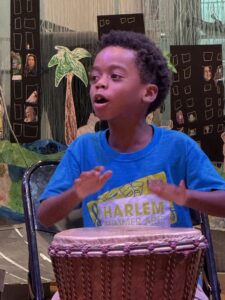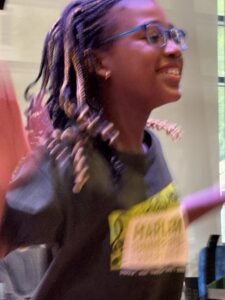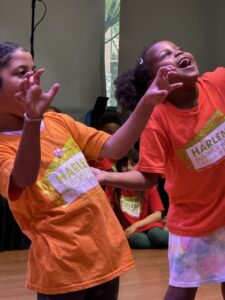Despite my fall a week earlier, and my hobbled state, I was determined to attend my eleven year old grandson’s performance at the Harlem School of the Arts (HSA). The week before, excitement rushed like an open hydrant across Jabari’s face, and through his voice, as he previewed the upcoming show and sang some of the lines from Alexander Hamilton.
HSA is a longstanding staple of the Harlem community.It offers classes to children of all ages in a variety of creative arts during the school year and summer camp. Salsa, ballet, hip hop, modern, African dance, keyboard, piano, violin, cello, bass, African drumming and visual arts are among their teaching menu. The performance that day marks the end of the first two weeks of camp.
The front to middle rows were filled when I arrived, and so for long periods I stood to videotape the children, those lined up next to us, awaiting their turn to take the stage, and those front and center performing. Their myriad faces, a panoply of expressions. The youngest, quizzical, as in, how is this going to work out, is it? Others, recognizing family seated adjacent to them, exchange smiles, find reassurance. The older faces, like Jabari’s, are more blasé, yet focused, awaiting their entrance, and more assured once on, fully into their routines, enjoying the humor flowing through their lines and the choreography. Names like Louis Armstrong, Langston Hughes, Celia Cruz, and Duke Ellington’s A-train flow through, unforced. There were song and dance routines, African drummers and skits across the age groups and lyrics of “I’m not gonna blow my shot” from Alexander Hamilton..
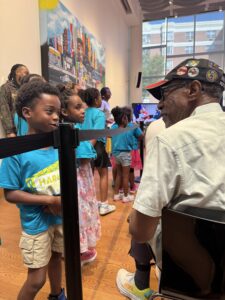
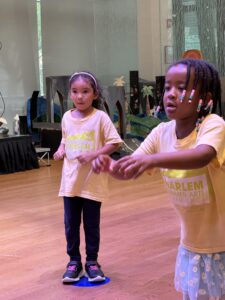 Pride owned the spacious room. The kind that’s soft and embracing in the cheering, and the loud and long clapping from the audience, for all the children. Not the sharp-edged kind of pride, delivered from a competitive eye that compares one’s child or grandchild to another to note how their loved one did better than another.
Pride owned the spacious room. The kind that’s soft and embracing in the cheering, and the loud and long clapping from the audience, for all the children. Not the sharp-edged kind of pride, delivered from a competitive eye that compares one’s child or grandchild to another to note how their loved one did better than another.
The room overflowed with welcoming.
We felt like a community of family, teachers, counselors, set managers and administrators reflecting a vision of our children as beautiful, capable and creative.
The abundance of care and confidence the predominantly Black teachers and counselors offered our children reached a deep well of historical and present pain in me. More so, witnessing the predominantly Black and Latinx children receive and manifest these gifts, a nectar often missing in institutions our children attend. I welcomed the water pooling in my eyes.
Black love is how we have survived in this land, along with the aid of abolitionists. It is how we thrive, when we do. It’s what I received in my segregated elementary school on the campus of Tuskegee Institute. Black teachers for whom there was nothing to prove our way out of, from whose confidence, knowledge and love, we learned.
When the show concluded, I sought out as many teachers and counselors I could to thank them for what they are doing. One counselor said, “I used to attend this camp, and it makes me feel good to work here.”
Of course, I took special pride in Jabari’s performances, his poise, particularly during the complex dance moves and his role as a co-emcee. And for the first time, I thought I might see the play Alexander Hamilton.

